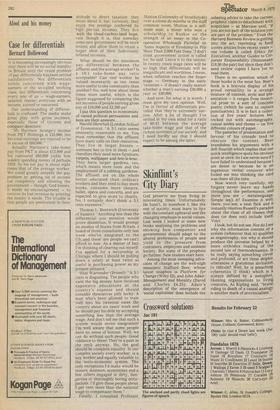Afoot and his money
Case for differentials
Bernard Hollowood
It is becoming increasingly obvious that there will be no social stability in Britain until the vexed problem of pay differentials has.been settled satisfactorily. Not differentials solely concerned with wageearners or the so-called working class, but differentials concerning every one of us — wagt-earners, salaried, render; everyone with an income, earned or unearned.
Our understanding of differentials is confused. The media make great play with gross incomes, especially those of tycoons and company directors:
-Mr Harrison Sconge's income from PKT Holdings is £35,000, but his total earnings are reputed to be in excess of E60,000."
Actually Harrison's take-home pay from PKT is about £12,000 and his rumoured £60,000 yields him weekly spending money of perhaps £310. So his net pay is about eight times that of the average worker. We could greatly simplify the pay problem by getting rid of income tax completely and allowing the government — though, God knows, it needs no encouragement — to recover its lost revenue by printing the money it needs. The trouble is that people are ambivalent in their
attitude to direct taxation: they moan about it, but, curiously, they enjoy the prestige conferred by high pre-tax incomes. They live with the cloud-cuckoo-land hope, vain thOugh it is, that someday some new government will be more • lenient and allow them to retain a larger slice of their ludicrously inflated incomes.
What should be the maximum pay differential between the affluent and the average worker? Is a 10:1 take-home pay ratio acceptable? Can one" worker be valued monetarily as ten times more useful to the community than another? No, well how about three times more useful, which is the figure suggested by comparing the net incomes of people earning gross pay of £10,000 and £2,500 pa?
I put this question to economists of varied political persuasions and here are their answers . .
Harold Skewball (London School of Economics): "A 3:1 ratio seems eminently reasonable to me. You must remember that the affluent have many calls on their resources. They live in larger houses someone has to live in them and therefore they need more furniture, carpets, wallpaper and bric:b-brac. They have larger gardens, too, which means more tools and the employment of a jobbing gardener. The affluent are on the whole better educated than ordinary workers and they tend to buy more books, consume more theatre, ballet, opera and concerts, and are expected to give more to charity. No, I certainly don't think a 3:1 ratio excessive."
Thomas L. Bentwich (University of Sussex): "Anything less than the differential you mention would prove disastrous. It would prompt an exodus of brains from Britain, I heard of three consultants only last week who've emigrated to the US, and these are people we can't afford to lose. As a matter of fact I'm thinking of clearing out myself: I've applied for a lectureship in Chicago where I should be pulling down a salary at least twice as useful in purchasing power as my present pittance."
Silas Warrender (Brunel): "A 3:1 ratio is disgusting. The people who earn the big money have received expensive educations at the country's expense and should consider themselves jolly lucky. A man who's been allowed to train well into his twenties owes the country about six years' work and he should pay his debt by accepting something less than the average wage. And don't tell me that such a system would invite emigration! I'm well aware that some people have no sense of honour. Well, we can do without such people. Good riddance to them! They're a pain in the neck anyway. No, the goal should be complete equality. In our complex society every worker is a key worker and equally valuable to the socio-economic system. The only exceptions I'd make would be miners, dustmen, economists and a few others engaged in dirty, dangerous or thoroughly boring occupations. I'd give these people about 5 per cent more than the qational wage to compensate them."
Finally, I consulted Professor
Mutton (University of Strathclyde) over a creme de menthe in the staff common room, Mutton is a selfmade man, a miner who won a scholarship to Ruskin on the strength of an essay in the Cooperative Wholesale Pictorial on 'Some Aspects of Firedamp in Pits More Than 2,000 Feet Deep.' I don't think government action is called for, he said. Leave it to the unions. In twenty years wage rates will be so high that differentials will be insignificant and worthless. I mean, when inflation reaches the hyper stage — Germany in the early 'twenties — it doesn't really matter whether a man's earning 00,000 a year or £40,000.
And now, for what it is worth, I must give my own opinion. Well, I'm in favour of differentials provided that they're extremely narrow. After a lot of thought I've settled in my own mind for a ratio of 40:41 between the average take-home wage and that of the richest members of our societ, and I need hardly say that I should expect to be among the latter.










































 Previous page
Previous page